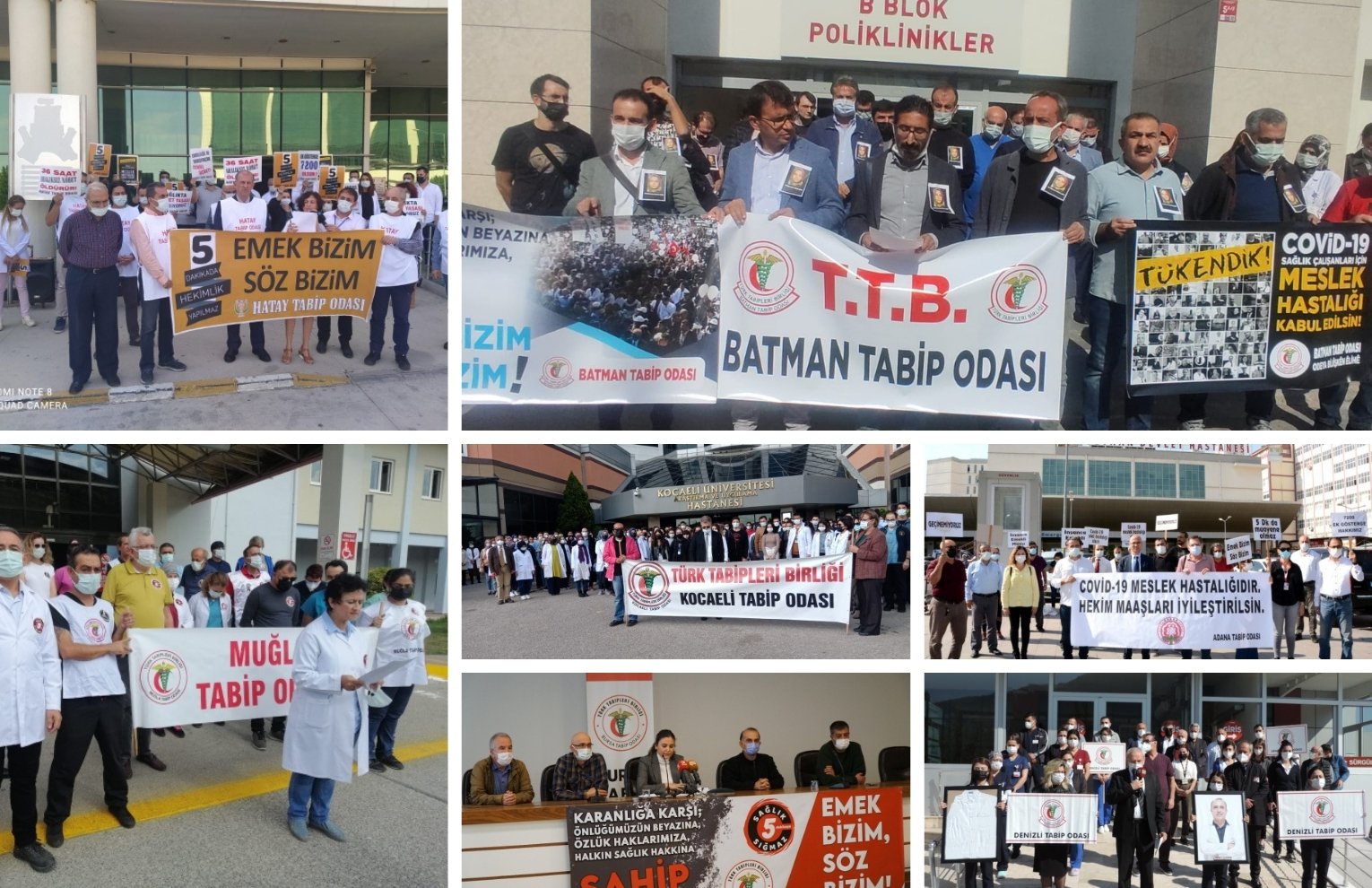As Covid-19 enters its second winter, poverty and hardship in Turkey is deepening by the day. Turkish citizens, silent so far, perhaps in fear of excessive use of force by the police or persecution, are gradually speaking up. The protests by students and faculty of Bosporus University against Erdogan-appointed president are still alive, as poor college students protested lack of affordable accommodation across the country.
Turkey had already witnessed small-scale but nation-wide marches this summer as result of government’s inability to extinguish wildfires, floods and other natural disasters. Now, it is health care professionals who took to the streets to protest inhuman working conditions.
A joint statement by several health care NGOs read: “We have been dying for 19 months, we have been getting sick for 19 months, we have been burning out day by day for 19 months because of those who did not take effective measures on time, turned their back on science, didn’t act transparently and changed the data”.
For 18 months, in-person classes were suspended in Turkey because of the pandemic. When universities opened their doors again, many students were in for a nasty surprise: Rents have become almost unaffordable. This is partly because of inflation and the corresponding price fluctuations, which have also affected the housing market. On top of this, Turkey’s government has not ensured that state-run student dormitories have sufficient capacity. There are barely 700,000 dormitory places for about 8.5 million students.
This difficult situation has motivated many students to air their grievances in public. Throughout September, students all across Turkey — more than 2,240 of them, according to the Interior Ministry — have been spending the night in public parks. The Barinamiyoruz (We Can’t Find Shelter) movement began in Istanbul’s Yogurtcu Park and was quickly emulated in other Turkish cities. In an open letter, the activists write that they have been left homeless by rent increases of 70-290%. “Because we have nowhere we can live in decent conditions,” they write, “we will create this possibility ourselves.”
WATCH: President Erdogan wants to go to the Moon, people want supper
The Turkish Medical Association (TTB) and medical chambers held protests in Adana, Batman, Bursa, Hatay, Muğla, Denizli and Kocaeli yesterday (October 27). The official recognition of COVID-19 as an occupational disease for health workers was among their demands.
Expressing their requests for a pay raise for all health workers as well, the Adana Medical Chamber made a press statement in front of the Seyhan Public Hospital. Meanwhile, physicians were holding banners that read, “No medical examination possible in five minutes”, “We cannot make a living” and “COVID-19 must be recognized as an occupational disease.”
WATCH: What do Turks think? Listening to opinion polls
The Batman Medical Chamber and the Health and Social Service Laborers’ Union (SES) Batman Branch also held a statement for the press in front of the Batman Training and Research Hospital.
Speaking in Batman province, TTB Central Council member Dr. Halis Yerlikaya said that there are serious problems in the field of healthcare, the pandemic has aggravated these problems further and paved the way for violence against health workers as well as their deaths.
Underlining that no one can practice good medicine by examining two people in 10 minutes, Yerlikaya said, “We want to work in a healthcare system where COVID-19 is recognized as an occupational disease, public health is cared for and our labor is reciprocated.”
Joint statement in seven cities
As part of these protests, physicians read out the same statement for the press in seven cities of Turkey:
We have been dying for 19 months, we have been getting sick for 19 months, we have been burning out day by day for 19 months because of those who did not take effective measures on time, turned their back on science, didn’t act transparently and changed the data.
Physicians criticized that “the way offered for the healthcare workers who did not want to work amid this transmission risk and heavy workload was to be forced to work for a long time.” They also recalled that “their right to take a leave, resign and get a medical report for leave were unlawfully prevented and 484 healthcare workers have lost their lives so far.”
“We were of course going to fulfil the requirements of our profession and we indeed do it, but we requested a transparent, rational and scientific management of the pandemic so that the entire burden of the process would not be put on our shoulders,” they underlined, briefly adding:
“In spite of this, perceptions were managed, not the outbreak. In this management of perceptions, our share was only the praises as heroes, applause from balconies and consolations of ‘We can never repay your labor.’ For a very long time, we could not even say ‘Ah’ because we were subjected to such a heavy emotional burden of ‘heroes don’t get tired.’
“Physicians resign because their professional honors are not credited even when they die. They migrate because our country still has no legal regulation on this while COVID-19 is recognized as an occupational disease in several countries. In short, physicians do not want to work as physicians in this land because our labor is disregarded.” (RT/SD)
Follow our English language YouTube videos @ REAL TURKEY: https://www.youtube.com/channel/UCKpFJB4GFiNkhmpVZQ_d9Rg
And content at Twitter: @AtillaEng
